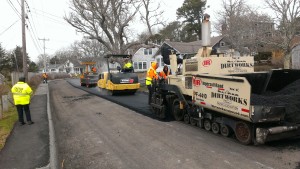Asphalt Pavement & Cleaner Air
Asphalt Pavement & Cleaner Air
 When most people think of clean air, they think of seaside breezes or crisp mountain air. Some people think of the things that can be detrimental to clean air, including emissions from manufacturing plants and vehicles. In recent years, more and more people are looking for ways to help contribute to cleaner air. However, asphalt pavement is often overlooked as a way to improve air quality.
When most people think of clean air, they think of seaside breezes or crisp mountain air. Some people think of the things that can be detrimental to clean air, including emissions from manufacturing plants and vehicles. In recent years, more and more people are looking for ways to help contribute to cleaner air. However, asphalt pavement is often overlooked as a way to improve air quality.
Asphalt Pavement & Cleaner Air – How It Contributes
Many people are surprised to discover that asphalt is an eco-friendly pavement choice. Asphalt does not shed toxic chemicals into the soil or water system, and it is often used to line reservoirs supplying drinking water to the public. However, when it comes to helping keep the air cleaner, asphalt pavement offers several benefits.
• Asphalt plants contribute very little to air pollution, according to the Environmental Protection Agency. Since the 1970s, asphalt producers have taken dramatic steps to reduce emissions; emissions today are only about 3 percent of what they were 40 or 50 years ago, but production has more than doubled.
• Because it requires less energy to produce asphalt pavement than other types of pavement, asphalt production generates lower levels of greenhouse gases, including carbon dioxide.
• The construction of asphalt pavement requires less time than the construction of concrete pavement, so new thoroughfares can be built much more quickly to reduce or eliminate traffic congestion. With fewer cars idling in a traffic jam, emissions are reduced.
• When asphalt pavement needs to be repaired, lane closures are typically brief. Concrete pavement may need to be closed for a week or longer, but most asphalt pavement can be reopened in less than 24 hours following the repair. Congestion is minimized, reducing the amount of emissions from vehicles caught in a traffic jam.
• Rough pavement forces vehicles to consume more fuel. Driving on a smooth road can save 4.5 percent in fuel consumption, and asphalt pavement is known for its smooth, quiet ride.
• Asphalt pavement can help reduce the heat island effect found in urban areas. Studies have shown that urban areas can be 10 degrees Fahrenheit or more hotter than the surrounding rural areas, increasing the demand for energy to cool homes and offices. At one time, people assumed that concrete’s lighter color would reflect more heat and help reduce the heat island effect. However, additional studies have found that the thickness of a pavement, the material’s heat-retention properties and the way that the pavement radiates heat can be just as important. Thermal images have shown that porous asphalt pavement can become significantly cooler than concrete pavement once the sun sets.
• More asphalt pavement is recycled every year than aluminum, paper, glass and plastic combined. Asphalt pavement, which is 100-percent recyclable, does not wind up in landfills. Most of the asphalt pavement that is recycled goes into the manufacture of new asphalt pavement, which saves on energy costs and reduces the demand for fresh petroleum distillates.
Clearly, asphalt pavement can make significant contributions to cleaner air. If you would like to learn more, contact the professionals at Dirtworks. Dirtworks is an asphalt company in Cape Cod and we have been providing exceptional work for more than 20 years. Our services include commercial and driveway paving, milling and reclamation, sealcoating, parking lot striping, snow removal, site work, and excavations. If you have more questions about Asphalt Pavement & Cleaner Air or would like a free quote, call us at (508) 240-5541 or submit our online form.
Recent Blogs






